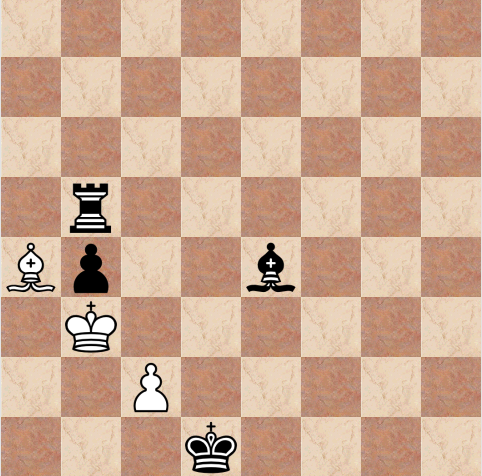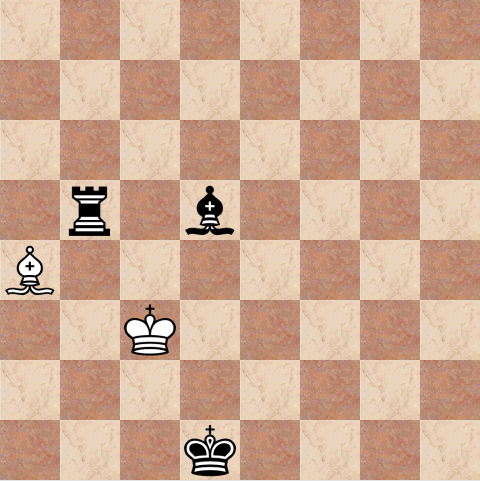No it is possible. Hint 1: Mike was on the right track with one of his speculations. Hint 2:
There is one move another piece could have made to reveal both black checks at the same time.
No it is possible. Hint 1: Mike was on the right track with one of his speculations. Hint 2:
There is one move another piece could have made to reveal both black checks at the same time.
A.S. Byatt’s The Luminaries absolutely blew me away. Best novel I’ve read in years, and firmly in my top ten of all time. The swathe of narrators, the seemingly loose strings, the overarching structure,… Mindblowing.
Ack! I confused Eleanor Cooney’s The Luminaries with A.S. Byatt’s The Children’s Book. I read them in the same period and they’re connected in my mind. I loved The Children’s Book almost as much as The Luminaries. Deeply emotional and intruiging family history, very interesting setting and time period, characters to love and yell at and feel sorry for and try to understand,…
I picked up a second-hand copy of her Possession the other day. I’m holding off on reading it until we go on our camping holiday to Luxembourg in August.
@Joey I still don’t get it. But I love puzzles which are hard. Even better if I have learned something after getting the solution (no matter if I solved it or got the solution told).
@Joey I’m not sure if this is what you had in mind (also @DeusIrae you were on the right track even if you never saw the full execution)

[Black] Bishop checks on d5. White blocks with c4. Black captures en passant on c3. The white king captures on c3 and is now standing there.
And voilá, this is a (the only possible) legal position!

There go my virtual 100 Euro…
Ah, I’ll let it go ![]() Raymond Smullyan would probably be delighted to know that people are still swearing his problem isn’t solvable!
Raymond Smullyan would probably be delighted to know that people are still swearing his problem isn’t solvable!
Of course it had to be en passant, my old nemesis!
I knew that Context link was going to lead to an @aschultz game before I clicked it ![]()
-Wade
To contribute to being on topic, I am reading A S Byatt’s Possession. And mostly loving it, though I’m bad at reading poetry. To onlookers, this book is not poetry, but it has a lot of poetry written by the characters in it.
I saw the film of Possession when it was new (2002). I remember really liking it as some kind of rollicking fantasy romance with time shenanigans and treasure-finding. Given how literary the book is, I’d certainly be interested to see the film again to apprehend the transformation from the source.
Something else I remember about the film is that it made me think the lead, Aaron Eckhart, should play Indiana Jones. That’s probably not what A S Byatt wanted me to come out with.
-Wade
I’ve decided to read all the Discworld novels in chronological print order. I think this is my third attempt at getting through Colour Of Magic, because it’s hard but because for some reason it’s a bit of a slog. I’ve been assured the books get a lot better once you get past the first few (and it’s not bad, it just sort of drags in places).
After that I think I’m going to finally finish House of Leaves.
Let me be one more person to assure you that the Discworld books get a lot better past the first few.
Discworld started as a straight-up fantasy parody. The further into the series, the more Terry Pratchett goes into satire of the modern world, more coherent plots, and more rounded characters. They’re still chock-full of tropes turned upside down, great puns, and brick jokes that sometimes land pages (or books…) later, but there’s more substance to the stories.
You’re in for a great journey!
I’ll second this, though I loved them from the start. Also, in later books I did miss all the footnotes - which I loved. He never stops doing them, but there are noticably fewer in later books. I remember introducing a dear friend to Discworld over 30 years ago. Our favorite and often (at random times) quoted line was CATS ARE NICE.
Manuals about figure drawing and how to draw people, it seems. ![]()
Lotsa papers and tutorials on animating calligraphy ![]()
“Empire Star”, a very innovative SF short novel by Samuel R. Delany from the 60ties.
I read the story 30 years ago and wondered how well it had aged. The answer so far: partly quite well, partly badly, unfortunately.
as Naval historian (a Naval historian is by definition also an historian of technology…) and coder, I reckon that computers is where SF ages very badly. e.g.in the SF “golden age” of 1930s, “computer” means “people hired or detailed for doing calculation”…
(curiously, no pre-1960s Navy has a “computer’s mate” rating, notwithstanding navigation and fire control needs, but dealing with army artillery up to 1960s is definitively where one must keep in mind this: Japanese infiltration deep to artillery battery CPs [1], for example: phrases like “…radiomen and computers fighting in close combat with Japanese infiltrators…” are a prime example of green books [2] puzzling youngsters…)
Best regards from Italy,
dott. Piergiorgio.
I just love the little surprises that sometimes come with second-hand books! Not long ago, I found a small blank note-paper with the heading of the Golden City Hotel in Istanbul. My mind immediately started spinning a slice-of-life story about someone reading this book on the balcony of their hotel-room when they noticed they were late for a guided city-trip and tore this impromptu bookmark off the notepad on the bedside table. Years later, I buy that same book and the note is still in there.
Needless to say I want to go to Istanbul now and stay in the Golden City Hotel. (I looked it up. It looks nice.)
And now I’m reading Ursula Le Guin’s Earthsea-trilogy, and I find this beautiful map folded between the pages:
A map of Earthsea drawn in silver/white lines on a blue background. A
spread-winged dragon perches on the upper/Northern border of the map.
I’m two thirds through, having read A Wizard of Earthsea and The Tombs of Atuan. I love it, but I keep questioning myself why I do. There’s nothing that original about the stories; especially the first one is a rather standard “rise of the apprentice mage”- tale.
But the world is so meticulously crafted, the archaic language is compelling (the quaint translation into Dutch by F. Oomes actually helps in this respect), the precisely placed details about nature or characters breathe life into the narrative.
Great read.
In other news: I found a book in my father’s library which reminded me of a certain jam that went on not too long ago:
In 1968 there sure was!
I am one hundred percent sure there was!
I’m saying that even now, having devoured Tolkien at thirteen and heaps of derivative stuff in the years after, having read many stories that take speculative fiction in other directions, as a reader who knows the fantasy tropes inside-and-out, Earthsea still manages to be absorbing and compelling, rising high above the derivative stuff I just mentioned.